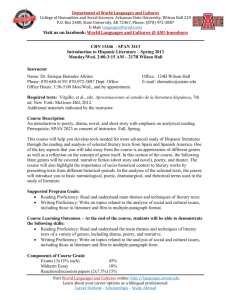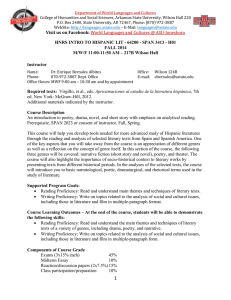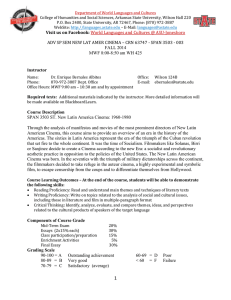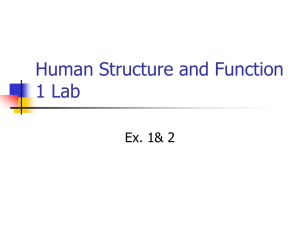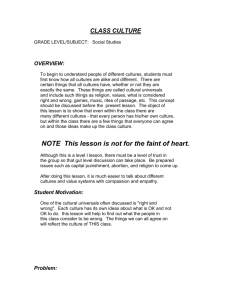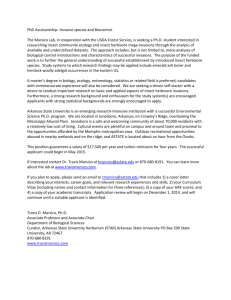Spanish 1013, Elementary Spanish I
advertisement
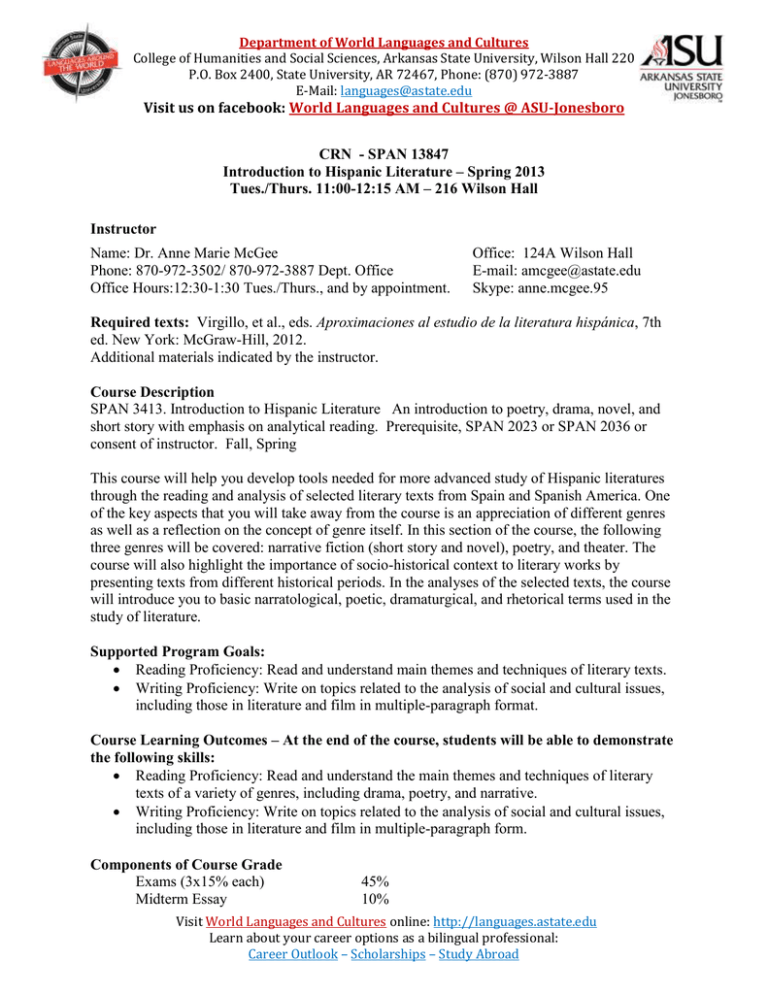
Department of World Languages and Cultures College of Humanities and Social Sciences, Arkansas State University, Wilson Hall 220 P.O. Box 2400, State University, AR 72467, Phone: (870) 972-3887 E-Mail: languages@astate.edu Visit us on facebook: World Languages and Cultures @ ASU-Jonesboro CRN - SPAN 13847 Introduction to Hispanic Literature – Spring 2013 Tues./Thurs. 11:00-12:15 AM – 216 Wilson Hall Instructor Name: Dr. Anne Marie McGee Phone: 870-972-3502/ 870-972-3887 Dept. Office Office Hours:12:30-1:30 Tues./Thurs., and by appointment. Office: 124A Wilson Hall E-mail: amcgee@astate.edu Skype: anne.mcgee.95 Required texts: Virgillo, et al., eds. Aproximaciones al estudio de la literatura hispánica, 7th ed. New York: McGraw-Hill, 2012. Additional materials indicated by the instructor. Course Description SPAN 3413. Introduction to Hispanic Literature An introduction to poetry, drama, novel, and short story with emphasis on analytical reading. Prerequisite, SPAN 2023 or SPAN 2036 or consent of instructor. Fall, Spring This course will help you develop tools needed for more advanced study of Hispanic literatures through the reading and analysis of selected literary texts from Spain and Spanish America. One of the key aspects that you will take away from the course is an appreciation of different genres as well as a reflection on the concept of genre itself. In this section of the course, the following three genres will be covered: narrative fiction (short story and novel), poetry, and theater. The course will also highlight the importance of socio-historical context to literary works by presenting texts from different historical periods. In the analyses of the selected texts, the course will introduce you to basic narratological, poetic, dramaturgical, and rhetorical terms used in the study of literature. Supported Program Goals: Reading Proficiency: Read and understand main themes and techniques of literary texts. Writing Proficiency: Write on topics related to the analysis of social and cultural issues, including those in literature and film in multiple-paragraph format. Course Learning Outcomes – At the end of the course, students will be able to demonstrate the following skills: Reading Proficiency: Read and understand the main themes and techniques of literary texts of a variety of genres, including drama, poetry, and narrative. Writing Proficiency: Write on topics related to the analysis of social and cultural issues, including those in literature and film in multiple-paragraph form. Components of Course Grade Exams (3x15% each) Midterm Essay 45% 10% Visit World Languages and Cultures online: http://languages.astate.edu Learn about your career options as a bilingual professional: Career Outlook – Scholarships – Study Abroad Department of World Languages and Cultures College of Humanities and Social Sciences, Arkansas State University, Wilson Hall 220 P.O. Box 2400, State University, AR 72467, Phone: (870) 972-3887 E-Mail: languages@astate.edu Visit us on facebook: World Languages and Cultures @ ASU-Jonesboro Reaction/discussion papers (3x5%) 15% Class participation/preparation 10% Enrichment Activities 5% Final Essay 15% Grading Scale 90-100 = A Outstanding achievement 80-89 = B Very good 70-79 = C Satisfactory (average) 60-69 = D < 60 = F Poor Failure Description of Course Components Preparation and participation (10%): This is a discussion-oriented class and thorough preparation and active participation in class work (class discussion, pair/group work, and any additional activities assigned by the instructor) are crucial. All readings must be prepared for the date indicated in the schedule. For every new reading, you need to read the introductory sections (“Vida y obra” and “El autor y su contexto”) and prepare the Cuestionario. Only consistently active preparation and substantive contribution to class discussions (one that propels class discussions forward) will earn full points on participation. Every few weeks students will submit a self-evaluation of his/her participation in the course. This will form a part of the overall participation grade. More detailed information will be made available on BlackboardLearn. Reaction/Discussion papers (15%): Over the course of the semester, students will write 3 brief (1-2 pages) reaction papers related to the course readings of a particular day. The topic of these short compositions is open, but students should reflect on some aspect of the reading that interests them, and come prepared to discuss their paper in small groups. These papers will often serve as a source of class discussions. Exams (45%): The course will have an exam at the end of each unit. The exam format will be selected from identifications (of terms, historical and biographical information, textual details, citations, etc.), short answer questions, and essay questions. Should you miss one of these exams, you must contact me ASAP and present, within 48 hours, written, verifiable proof of an urgent reason (such as illness—a doctor’s note indicating an office visit on the day of the exam or an earlier visit with an indication of need to miss school on the date of the exam—or family emergency). Any make-up must be taken within 2 days of the in-class exam. Essays (25%): There will be two formal essays in this course. Specific topics for each essay will be posted on Blackboard Learn at least one week in advance. The first essay will be worth 10% of the final grade; the second essay will be worth 15 % of the final grade. Both papers must be typed, double-spaced, Times New Roman 12-pt. font, in Spanish. Electronic submissions will not be accepted. Both papers will be graded on: a) the quality of presented ideas: relevant, specific, and original thesis that that goes beyond class discussion and requires argumentation, discussion contains no truisms, general/obvious statements, personal opinions, irrelevant or unsupported claims; Visit World Languages and Cultures online: http://languages.astate.edu Learn about your career options as a bilingual professional: Career Outlook – Scholarships – Study Abroad Department of World Languages and Cultures College of Humanities and Social Sciences, Arkansas State University, Wilson Hall 220 P.O. Box 2400, State University, AR 72467, Phone: (870) 972-3887 E-Mail: languages@astate.edu Visit us on facebook: World Languages and Cultures @ ASU-Jonesboro b) the presentation of ideas: relevant and informative title, the main point and its significance (the “so what?”) are stated upfront; clear topic sentences stating main ideas along with their relevance and importance; general command of academic style-transitions between paragraphs and sentences; c) stylistic issues and advanced expression in Spanish: adequate word choice, grammar, syntax, mechanics, etc. All work must be original. Students may not receive any help in any form (human or electronic) on these papers. For both papers, late work will not be accepted without a written, verifiable proof of an urgent reason for missing the due date. Enrichment Activities (5%): This grade is based on academic engagement in Department sponsored or approved co-curricular activities: Minimum requirement is completion of 10 units of academic engagement activities per semester. Accepted activities include participation in the tutoring program, conversation tables, Spanish language film showings, multicultural fairs and any other related and preapproved activities. Students must document their participation with paragraph length commentary in Spanish on the content and focus of the activity. Attendance Policy Class attendance is required for successful completion of the course. Students should attend every lecture, recitation and laboratory session of every course in which they are enrolled. Students who miss a class session should expect to make up missed work or receive a failing grade on missed work. Please know that your grade may also be negatively impacted by an absence as you will not be able to make up any quizzes that you may have missed and may also not contribute to class when you are not there; hence your class activity grade would be an F for the day you missed. It is the practice of Arkansas State University to allow students to participate in university-sponsored events, even when those events cause them to be absent from class. Students participating in university-sponsored events will be given reasonable opportunities to make up missed assignments and exams. Students enrolled in full semester freshman or sophomore level courses numbered 1000 or 2000 may during the spring and fall semester miss no more than twice the number of lectures, recitations, laboratory sessions, or other regularly scheduled class activities that would normally be scheduled during a week. Students in half session courses (7 week sessions) may not miss more than the number of meetings per week per session. Students who miss more than the maximum number of freshman or sophomore level classes may be assigned a grade of “F” for the course. Students who may be assigned a grade of “F” in a course because of excessive absences may withdraw from the course without penalty before the deadline for dropping an individual course. In determining whether excessive absences should result in a failing grade, consideration shall be given to the maturity and class standing of the student, the quality of academic work being accomplished by the student, and extenuating circumstances related to such absence. Visit World Languages and Cultures online: http://languages.astate.edu Learn about your career options as a bilingual professional: Career Outlook – Scholarships – Study Abroad Department of World Languages and Cultures College of Humanities and Social Sciences, Arkansas State University, Wilson Hall 220 P.O. Box 2400, State University, AR 72467, Phone: (870) 972-3887 E-Mail: languages@astate.edu Visit us on facebook: World Languages and Cultures @ ASU-Jonesboro If you are absent from class, you are responsible for making arrangements to have work turned in on the due date and for informing yourself regarding the information covered in class during your absence. To be well prepared for the next class meeting, you will need to make up for the work missed independently. Tutors are available to assist you in your learning progress, but it is your responsibility to assure that you do not fall behind in your work. All work is accepted only on or before the due dates specified in the syllabus. A regularly scheduled test may be made up only in the cases of documented illness or an authorized university activity. No other make-up work will be assigned or accepted. We expect you to arrive to class on time. It is up to the discretion of the instructor to count tardiness as an absence; hence be certain to avoid tardiness and know that tardiness will affect you ability to obtain good grades in this course. We also appreciate if you arrive to class with proper dress as in the target culture you are studying attention to such details is very important. Inclement Weather Policy (as per Student Handbook) The university remains open for academic classes and all other services during inclement weather except in extreme circumstances determined solely by the Chancellor of the University. Regional and local news media will publicize the closing. Commuter students are encouraged to use good judgment in deciding whether to drive to campus during inclement weather. In those cases where the decision is made not to travel to campus under this policy, it is the responsibility of the student to immediately contact each of his/her professors upon return to explain the circumstances and to determine the need to complete any missed assignments. The student is responsible for all missed assignments during inclement weather within a time frame to be determined by the professor. Disabilities Policy If you have a disability that makes it difficult for you to succeed in this course, please contact me as soon as possible. Your privacy will be respected and every effort will be made to meet your needs. All students requesting accommodations for disabilities should be registered through ASU’s Disability Services (870 972 3964). If Disabilities Services determines you should be able to take tests in their office, it is your responsibility to schedule the test for the same time and date as the exam is administered to other students. Academic Misconduct (as per Student Handbook) Arkansas State University enthusiastically promotes academic integrity and professional ethics among all members of the ASU academic community. Violations of this policy are considered as serious misconduct and may result in severe penalties. A. Plagiarism Visit World Languages and Cultures online: http://languages.astate.edu Learn about your career options as a bilingual professional: Career Outlook – Scholarships – Study Abroad Department of World Languages and Cultures College of Humanities and Social Sciences, Arkansas State University, Wilson Hall 220 P.O. Box 2400, State University, AR 72467, Phone: (870) 972-3887 E-Mail: languages@astate.edu Visit us on facebook: World Languages and Cultures @ ASU-Jonesboro Plagiarism is the act of taking and/or using the ideas, work, and/or writings of another person as one's own. To avoid plagiarism give written credit and acknowledgment to the source of thoughts, ideas, and/or words, whether you have used direct quotation, paraphrasing, or just a reference to a general idea. If you directly quote works written by someone else, enclose the quotation with quotation marks and provide an appropriate citation (e.g., footnote, endnote, bibliographical reference). Research, as well as the complete written paper, must be the work of the person seeking academic credit for the course. (Papers, book reports, projects, and/or other class assignments) Discipline: Faculty members may respond to cases of plagiarism in any of the following ways: 1. Return the paper or other item for rewriting; the grade may be lowered. 2. Give a failing grade on the paper or other item-"F" if a letter grade is used or zero if a numerical grade is used. 3. Give the student who plagiarized a failing grade in the course. 4. Recommend sanctions, including disciplinary expulsion from the university. B. Cheating Cheating is an act of dishonesty with the intention of obtaining and/or using information in a fraudulent manner. Observing and/or copying from another student's test paper, reports, computer files and/or other class assignments. Giving or receiving assistance during an examination period. (This includes providing specific answers to subsequent examinees and/or dispensing or receiving information that would allow the student to have an unfair advantage in the examination over students who did not possess such information.) Using class notes, outlines, and other unauthorized information during an examination. Using, buying, selling, stealing, transporting, or soliciting, in part or in whole the contents of an examination or other assignment not authorized by the professor of the class. Using for credit in one class a term paper, book report, project, or class assignment written for credit in another class without the knowledge and permission of the professor of the class. Exchanging places with another person for the purpose of taking an examination or completing other assignments. Discipline: Faculty members may respond to cases of cheating in any of the following ways: Visit World Languages and Cultures online: http://languages.astate.edu Learn about your career options as a bilingual professional: Career Outlook – Scholarships – Study Abroad Department of World Languages and Cultures College of Humanities and Social Sciences, Arkansas State University, Wilson Hall 220 P.O. Box 2400, State University, AR 72467, Phone: (870) 972-3887 E-Mail: languages@astate.edu Visit us on facebook: World Languages and Cultures @ ASU-Jonesboro Allow the testing to progress without interruption, informing the offending student about the offense-and award a failing grade on the test-"F" if a letter grade is used or zero if a numerical grade is used. 2. Seize the test of the offending student and give a failing grade on the paper. 3. Give the offending student a failing grade in the course. 4. Recommend sanctions, including disciplinary expulsion from the university. 1. Cell-phones and Other Communication Devices Cell-phones and other communication devices must be turned off and out of sight for the duration of class and exams. These devices may not be utilized at any point during class sessions. Important Dates Regular Classes Begin – January 14 Last Day to Drop/Withdraw Without Financial Assessment – January 20 Last Day to Drop Session I Courses – September 25 Last Day to Add Session II Courses – February 19 Session II Classes Begin – March 4 Spring Break – March 18-23 Last Day to Drop a Course or Withdraw from the University – April 24 Last Day of Classes – April 29 Study Day – April 30 Final Examinations – May 1-7 Class Schedule Jan. 15 Introducción al curso y a la narrativa, la narrativa pp. 10-19; El cuento: guía general, p. 41. 17 Don Juan Manuel, “Lo que sucedió…”(pp. 42-46) 22 Ricardo Palma, “La camisa de Margarita.” (pp. 46-50) 24 Emilia Pardo Bazán “Las medias rojas” (pp. 50-53) 29 Jorge Luis Borges, “El etnógrafo.” (pp. 59-61) 31 Julio Cortázar, “La noche boca arriba.” (pp. 61-68) Feb. 5 Juan Rulfo, “No oyes ladrar los perros” (pp. 68-72); La generación del 98, p. 33; La novela: guía para el lector, p. 41., introducción de Miguel de Unamuno, San Manuel Bueno, mártir, p. 110. 7 Miguel de Unamuno, San Manuel Bueno, mártir 110-119, Cuestionario 1-8. 12 San Manuel Bueno, mártir 119-127, Cuestionario 9-14. Visit World Languages and Cultures online: http://languages.astate.edu Learn about your career options as a bilingual professional: Career Outlook – Scholarships – Study Abroad Department of World Languages and Cultures College of Humanities and Social Sciences, Arkansas State University, Wilson Hall 220 P.O. Box 2400, State University, AR 72467, Phone: (870) 972-3887 E-Mail: languages@astate.edu Visit us on facebook: World Languages and Cultures @ ASU-Jonesboro 14 San Manuel Bueno, mártir 127-134, Cuestionario 15-27. 19 Termina SMBM, Repaso para el examen. 21 Examen I—La narrativa. 26 La poesía, pp. 138-157. Poesía: guía general p. 173. El romance, “El Enamorado y la Muerte” y “Romance del conde Arnaldos” 28 Garcilaso de la Vega, “Soneto XXIII” y “Soneto XI” Entregar el primer ensayo (narrativa) Marzo 5 Luis de Góngora, “Soneto CLXVI”; San Juan de la Cruz, “Noche oscura” 7 Sor Juana Inés de la Cruz, “A su retrato” y “A una rosa” 12 Lope de Vega, “Rimas sacras: XVIII,” Francisco de Quevedo, “Representáse…” 14 José Martí, “Si ves un monte de espumas” y “Dos patrias” SPRING BREAK 18-23 de Marzo 26 Rubén Darío, “Canción de otoño en primavera”; Vicente Huidobro, “Arte poética” 28 Alfonsina Storni, “Hombre pequeñito” y otros de Delmira Agustini (on blackboard learn) Abril 2 Nicolás Guillén, “Sensemayá,” y otros (bblearn) y Repaso para el examen. 4 Examen II – La poesía. 9 El teatro, pp. 252-265; El drama: guía general, pp. 290-291. Federico García Lorca, Introducción a La casa de Bernarda Alba. Leer la nota sobre García Lorca y el drama de la Generación del 27 en p. 279 11 La casa de Bernarda Alba 16 La casa de Bernarda Alba 18 La casa de Bernarda Alba 27 Repaso para examen III 29 Examen III – El drama. Trabajo final – May 2, 12:30-2:30 Visit World Languages and Cultures online: http://languages.astate.edu Learn about your career options as a bilingual professional: Career Outlook – Scholarships – Study Abroad
